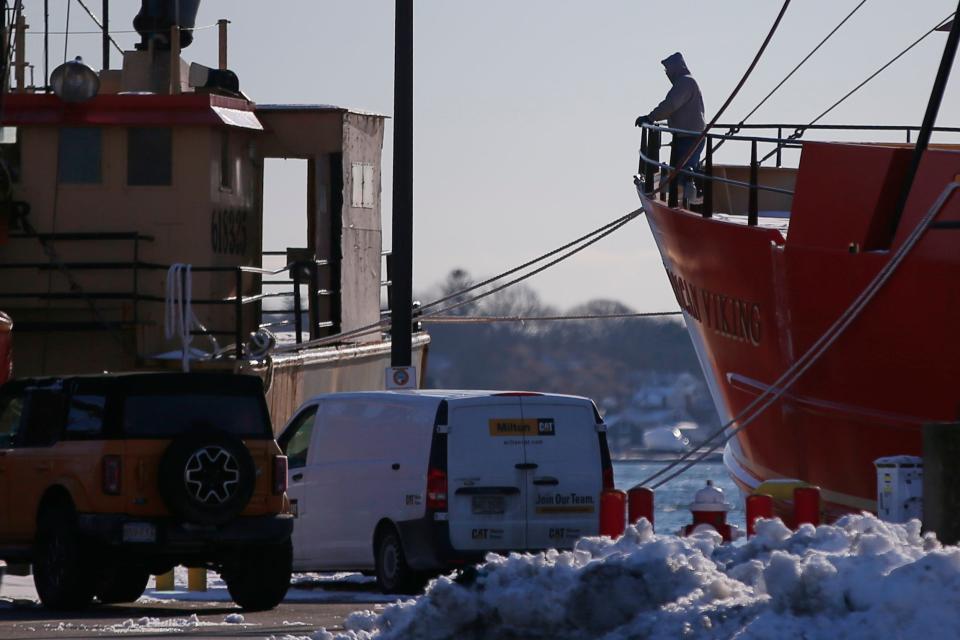New legislation aims to bolster the blue economy. Here's how it will impact New Bedford.
- Oops!Something went wrong.Please try again later.
- Oops!Something went wrong.Please try again later.
- Oops!Something went wrong.Please try again later.
BOSTON — Coastal lawmakers presented several pieces of legislation Thursday that would advance Massachusetts’ marine industries while also focusing on wildlife conservation and habitat protection.
The state’s blue economy entails a wide spectrum of jobs from fishermen to tech workers. It’s currently valued at $8.2 billion, according to lawmakers, and between 2009 and 2019, Massachusetts’ blue economy grew by 38%.
The legislation was introduced with the support of the New England Aquarium in Boston, indicating a slightly new and involved role in state policy for the 54-year-old institution.
“Right now, the commonwealth is at a pivotal moment where the blue economy is projected to grow even further,” said Vikki Spruill, president and CEO of the Aquarium, at a press conference to unveil the legislative package. “But the growing industrialization of the ocean combined with the warming waters in the Gulf of Maine is threatening, and in some cases causing significant changes, to our coastal ecosystems.”
Jamie Berberena, the membership and partnership director at Groundwork Southcoast in New Bedford, a community-based environmental advocacy organization, explained that the city depends on the coast in more ways than one, but particularly with respect to its fisheries. New Bedford, for the past 21 years, has consistently had the highest value of seafood catch of any port in the country.
Balancing rich ports and fisheries with clean waterways
“We have some really rich ports and fisheries,” said Berberena. “We also have to make sure to clean our waterways and shorelines to support those fisheries, because they’re really prevalent in New Bedford.”
Sen. Susan Moran, D-Falmouth, and Reps. Dylan Fernandes, D-Falmouth, Jessica Giannino, D-Revere and Kathleen LaNatra, D-Kingston, introduced the six bills that have already been filed at the Statehouse at Thursday’s press conference.

“If we want to live up to our reputation as a forward-thinking state, we must dream big and dream blue,” Moran said.
Blue workforce jobs for New Bedford residents
Presented by Moran in the Senate and LaNatra in the House, An Act Relative to a Future Blue Economy would prioritize emboldening a “blue workforce” by establishing a grant with the Department of Elementary and Secondary Education to fund competitive job placement services for students looking to enter ocean-related industries such as marine biotechnology, ocean transport or commercial fishing.
Berberena explained how legislation that empowers the blue economy could also pay dividends to New Bedford residents, provided that lawmakers keep their communities in mind.
“If there are jobs that are created, the local residents should be prioritized to take advantage of those job opportunities,” she said. “It gives residents a chance to be empowered and to be included in decision-making.”
Moran and LaNatra also presented An Act to Establish a Blue Economy Workforce Pipeline which would focus on educating the public on how to transition to a “circular” economy, a model that incentivizes companies to produce as little waste as possible and instead to reuse products. The bill would also provide aid to minority- and women-owned small businesses looking to make the transition in an effort to prioritize equity.
A process to deal with blue carbon
Moran and Giannino presented An Act to Promote Natural Carbon Sequestration which would institute a net-positive carbon sequestration goal, limiting greenhouse gas emissions. It also would direct significant research efforts toward the “blue carbon” process, when carbon emissions are mitigated by natural environments like Massachusetts’ marshes, such as the Rumney Marsh Reservation in Giannino’s district or the Acushnet Cedar Swamp State Reservation in New Bedford.
An Act Establishing a Fisheries Conservation Gear Grant Program, proposed by Reps. Josh Cutler, D-Pembroke and Patrick Kearney, D-Marshfield, focuses on protections for the critically endangered North Atlantic right whale, of which there are approximately 336 left. The whales have been known to get caught in fishing nets — 86% of right whales identified have become entangled one or more times a year — so the bill proposes creating a grant that will help fisheries afford higher-tech gear with much less rope, thereby protecting the whales.
Catch down:Atlantic sea scallops at lowest biomass in over 20 years — what that means for New Bedford
An Act to Overcome Coastal and Environmental Acidification and Nutrient Pollution and An Act Establishing the Blue Communities Program, both filed by Fernandes and Sen. Julian Cyr, D-Truro, would regulate acidification and eutrophication — an excessive amount of nutrients in the water which can be deadly to marine life — in local waters. Fernandes said that these measures would benefit local human populations as well.
“All people have a right to clean water, and it is the responsibility of all of us to ensure that we are good stewards of the ocean environment,” Fernandes said.
Get a deal:Why this is a great time to subscribe to The Standard Times.
Hendricks co-sponsored blue economy and workforce pipeline bills
As of now, Rep. Christopher Hendricks, D-New Bedford, has co-sponsored the future blue economy and the workforce pipeline bills, but no other New Bedford legislators have signed on to any of the other bills in the package. Berberena said there might be a chance for that to change.
“Legislators from the South Coast region have a lot of opportunity to uplift the work that’s currently being done and develop new partnerships to combat climate change,” Berberena said. “I think if they get their information directly from their constituents, they can cosign it and uplift the blue economy.”
However, Berberena added what is most important is that the work to protect the oceans and prevent climate change is not over, even if the bills become laws.
“The sky’s the limit when it comes to what can be done,” she said.
This article originally appeared on Standard-Times: Legislation aims to bolster the 'blue economy' in partnership with Aquarium

